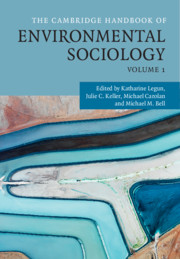Book contents
- The Cambridge Handbook of Environmental Sociology Volume 1
- The Cambridge Handbook of Environmental Sociology
- Copyright page
- Contents
- Figures
- Tables
- Contributors
- Foreword
- Introduction
- Part I Theory in Environmental Sociology
- Part II The Economy and Environmental Sociology
- Part III Culture and Environmental Sociology
- Part IV Politics, Power, State
- 17 Conflicting Environmental Imaginaries in Post-Apartheid South Africa
- 18 The Growth in International Audit Culture: Achieving Agricultural Sustainability Inside a World of Measures?
- 19 Political Ecologies of State Land Management
- 20 Green Crime and the Treadmill of Production
- 21 Governing Science and Technology: From the Linear Model to Responsible Research and Innovation
- 22 The Paradox of Public Knowledge in Environmental Sociology
- 23 Relational Resilience and the Making of Diverse Worlds
- Part V Social Justice
- Index
- References
23 - Relational Resilience and the Making of Diverse Worlds
from Part IV - Politics, Power, State
Published online by Cambridge University Press: 05 November 2020
- The Cambridge Handbook of Environmental Sociology Volume 1
- The Cambridge Handbook of Environmental Sociology
- Copyright page
- Contents
- Figures
- Tables
- Contributors
- Foreword
- Introduction
- Part I Theory in Environmental Sociology
- Part II The Economy and Environmental Sociology
- Part III Culture and Environmental Sociology
- Part IV Politics, Power, State
- 17 Conflicting Environmental Imaginaries in Post-Apartheid South Africa
- 18 The Growth in International Audit Culture: Achieving Agricultural Sustainability Inside a World of Measures?
- 19 Political Ecologies of State Land Management
- 20 Green Crime and the Treadmill of Production
- 21 Governing Science and Technology: From the Linear Model to Responsible Research and Innovation
- 22 The Paradox of Public Knowledge in Environmental Sociology
- 23 Relational Resilience and the Making of Diverse Worlds
- Part V Social Justice
- Index
- References
Summary
The notion of “resilience” is rife with controversy, particularly when attempting to bridge theory across disciplines. In this paper, we propose one way to overcome some of the challenges with resiliency thinking that are often put forward by social scientists. We do this by applying relational theorizing to the concept. Here, we can understand resilience as the ways in which actors (human and non-human) associate into enduring, diverse, and equitable networks. We argue that diversity is an expression of capabilities for transformation and that such expressions become more possible with equity. Drawing on field work, we iteratively ground this relational approach to resilience in two co-operative network cases. It is recommended that future work continues to develop a less bounded and more relational view of resilience.
- Type
- Chapter
- Information
- The Cambridge Handbook of Environmental Sociology , pp. 379 - 396Publisher: Cambridge University PressPrint publication year: 2020
References
- 1
- Cited by

